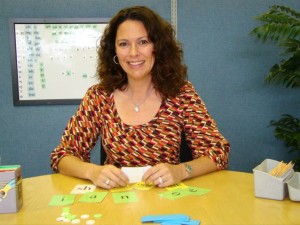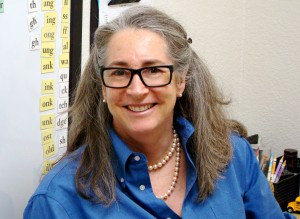
by PRIDE Reading Program Admin | Nov 16, 2015 | A PRIDE Post, Spelling
I know many adults who truly believe that they cannot spell, saying “I can’t spell” in the same manner that they would say, “I can’t swim.” But spelling, like swimming, can be taught. However, while most teachers know how to test for spelling, very few know how to teach spelling.
There is a misconception that spelling is a form of dyslexia, a disorder where one is unable to recognize words or sound them out phonetically. The acts of reading and writing occur mainly in the left temporal lobe of your brain – the part of the brain near your left ear. The act of spelling, however, occurs mainly in the occipital lobe of your brain – the visual cortex in the back of your head responsible for forming and retrieving visual memories. So, to remember how to spell a word, you must first store the memory of that word, and then retrieve that “picture” when you are about to write it.
The Three Types of Memory
When I teach spelling to children and to adults, I first talk about the three types of memory. The first type of memory can be called “Blackboard” memory, which lasts from 1-30 seconds. The goal of your brain in Blackboard memory, surprisingly, is to forget what you’ve seen. For example, if you’re driving down the street and see various business signs, “Tom’s Bakery,” “Joe’s Key Shop”, “Chan’s Dry Cleaners,” etc., you certainly don’t want to keep remembering Joe’s Key Shop for the rest of the day. Rather, a “slide” of Joe’s Key Shop is stored in your visual memory, but you’ve made no pathway to consciously retrieve the memory. Occasionally there may be an accompanying smell (such as the bakery next to the key shop) which may remind you of the key shop, but you’ll most likely not remember that the key shop exists. So, when you actually need a key made, you’ll probably have to search the listings for one, and lo and behold, there’s Joe and his key shop right around the corner!
The second type of memory can be called Short-Term Memory, which lasts from 31 seconds to about 2-3 months. Most children rely on Short-Term Memory to recall information for tests, midterms, and final exams, but then forget the information the following year (which explains why kids have to be re-taught “mean, median, and mode” every year from elementary to high school). The third type of memory, Long-Term Memory, is the stored memories of experiences and information that we will always be able to recall, either from connection to an emotional event (e.g., World Trade Center) or from multiple uses (e.g., names, phone numbers, addresses, etc.).
The goal of all learning, then, is to place what needs to be remembered into the student’s Short-Term Memory, so that facts, dates, and the spelling of words can be recalled. Once this information is stored in Short-Term Memory, a pathway is established so that the student is able to consciously retrieve the information for up to 3 months. If there is repeated exposure to the information, this pathway becomes even more established, forming a Long-Term Memory.
Simple Technique for Perfect Spelling
Teaching spelling in school is usually done by having a student copy the words over and over again, which of course does not work at all. By copying the words, their spelling never leaves the student’s Blackboard Memory, so the brain does its job well and dutifully helps the student forget the spelling. The goal, then, is to place the spelling of the word in the student’s Short-Term Memory, so it’s “picture” can be retrieved.
Here is a simple technique that you can do at home to help your child succeed in spelling:
1. Have your child write the spelling word on a piece of paper, then trace the letters with his or her index finger while saying the spelling word out loud. Have the child say the word normally while tracing it, not say or sound out individual letters or vowels.
2. Take the paper away and wait a minimum of 30 seconds (e.g., sing the “Jeopardy!” theme or some other song).
3. Give your child a blank paper, saying, “Now, write the word you traced.”
4. If your child spells the word incorrectly – which is likely to occur at the beginning of this technique – go back and repeat steps 1-3.
Once your child has established a pathway to the Short-Term Memory of a word’s spelling, it’s THERE – the brain has no way of knowing if that pathway was established 31 seconds ago, one week ago, or one month ago. And since the pathway is there, your child WILL remember the spelling of the word.
I’ve used this technique with parents and children for many years, even students with mild traumatic brain injury, and I’ve never come across a student who did not suddenly go from the worst speller to the best speller in the class.
Good luck!………………..Dr. David.
Learn more about the New PRIDE Reading Program
_____________________________________________________________________________
David Raffle, PhD, CBIS, is a credentialed special education teacher, educational specialist, and brain injury specialist who performs neuropsychological and psychoeducational testing for special education services, standardized testing accommodations, and modifications in the workplace for children, adolescents, and adults with developmental disabilities, traumatic and acquired brain injuries, attention-deficit/hyperactivity disorder, and autism spectrum disorders.
Visit Dr. Raffle’s website at: https://www.DavidRafflePhD.com or email him at: davidrafflephd@gmail.com

by PRIDE Reading Program Admin | Nov 16, 2015 | A PRIDE Post, Tutoring & Remediation
Beverly Hills has very accelerated and academic programs in their schools. The kids that go to school in Beverly Hills often need extra assistance and extra outside help. According to a survey from The National Center for Family Literacy, at least 50 percent of parents turn to tutoring because they feel they cannot help their children. When a child struggles in reading, they often fall behind. If a child has difficulties in reading and comprehension, chances are a specialized reading tutor in Beverly Hills will be necessary. So…. which tutor does a parent choose and who is the best reading tutor in Beverly Hills?
Multisensory Teaching Experience
Children with reading, writing and comprehension difficulties learn best with a specific type of instruction. They will need a multisensory structured language program based on an approach called the Orton-Gillingham. Orton-Gillingham tutors are available at PRIDE Learning Center in Beverly Hills. The tutors at PRIDE Learning Center have teaching credentials with strong special education backgrounds. The tutors are all experienced and certified Orton-Gillingham specialists and are trained in a multisensory approach.
Orton-Gillingham Teaching Experience
It takes very specific skills to teach students to read and comprehend. A tutor with these skills call themselves Reading Specialists or Educational Therapists. There are no regulations about who can or can’t use these titles, so it is important to check on which methodology for teaching reading and comprehension they use. It is best to use a specialized reading tutor in Beverly HIlls that is trained in teaching students in the Orton-Gillingham methodology. This is by far the very best and most effective option for struggling readers. The reading tutors at PRIDE Learning Center are all Orton-Gillingham trained.
One-On-One Teaching Experience
Most struggling readers need one-on-one help so that they can move forward at their own pace. In addition, these students often need a great deal of structured practice and immediate, corrective feedback to develop automatic word recognition skills. The reading tutors at PRIDE Learning Center are available and open for one-on-one lessons at least 4 hours a week.
So…..who is the BEST????
The best reading tutor in Beverly Hills is PRIDE Learning Center because they use:
- The right program (Orton-Gillingham Program)
- The right tutor (someone trained in Orton-Gillingham and multisensory teaching)
- The right intensity (at least 4 hours a week)
- The right setting (one-on-one)
For more information on PRIDE Learning Center’s reading, writing and comprehension tutoring program call 866-774-3342 today.
________________________________________________________________________

Karina Richland is the Founder of PRIDE Learning Centers, LLC. Ms. Richland is a certified reading and learning disability specialist. Ms. Richland speaks frequently to parents, teachers, and professionals on learning differences, and writes for several journals and publications.
You can reach her by email at karina@pridelearningcenter.com or visit the PRIDE Learning Center website at: www.pridelearningcenter.com
by PRIDE Reading Program Admin | Nov 2, 2015 | Summer Programs
Registration Policies
All PRIDE Learning Centers LLC Summer Camp (PRIDE Summer Camp) registrations require a $300 deposit at the time of registration. The deposit will be deducted from the total price of the student’s PRIDE Summer Camp tuition, and is non-refundable once submitted. The remaining tuition balance will be due on or before May 19th 2017. Once the PRIDE Summer Camp has begun there will be no refunds issued, as space and a teacher have been contracted for your student. This includes students who do not appear for their lessons, as well as those who stop attending. By registering for PRIDE Summer Camp you understand that PRIDE Summer Camp reserves the right to deny continued enrollment to any student if PRIDE Summer Camp concludes the actions of the student or parent are inconsistent with the establishment and maintenance of a positive working relationship. It is understood that fees will not be refunded in the case of removal of student from PRIDE Summer Camp.
Release and Waiver
I hereby acknowledge that I have voluntarily chosen to allow my student to attend PRIDE Summer Camp. I understand and recognize that each PRIDE Summer Camp activity may involve risk of injury to my child and I agreed to accept any and all risks associated with it. By voluntarily allowing my child to participate in activities and with the knowledge of the risk involved, I hereby agree to accept any and all inherent risks.
Hold Harmless
In consideration of allowing my child to participate in the PRIDE Summer Camp and to the fullest extent permitted by law, I agree to hold harmless PRIDE Learning Centers LLC, its employees and any assigns from and against all claims arising out of or resulting from my child participation in PRIDE Summer Camp. I hereby voluntarily hold harmless and release PRIDE Learning Centers LLC it’s trustees, officers, employees, agents and assigns from any and all claims arising out of or incident to my student’s participation in the PRIDE Summer Camp which may be made on behalf of me, my student, my personal representative and my heirs or assigns.
No Make-Ups Credits or Refunds Allowed For Missed Days
PRIDE Learning Centers LLC is not responsible for lost or stolen items.
Returned Checks
There is a $75.00 charge for returned checks.
Consent to Photograph, Video or Audio Tape.
Student’s image by photograph, video or audio footage may be used by PRIDE Learning Centers LLC in brochures, website and other promotional materials including social media.
Permission to Participate
I hereby give my full consent and permission for my child to participate in all recreational, athletic, academic and extracurricular activities offered by PRIDE Summer Camp. My child is in good health and physically fit and has not been advised by a healthcare provider not to participate in physical activities.
Consent to Treatment of a Minor
I understand and acknowledge that occasionally a non-emergency may develop which necessitates the administration of non-emergency first aid to my student. In the event of a non-emergency injury or illness which necessitated the administration of non-emergency first aid, I hereby authorize PRIDE Summer Camp and its staff in charge of the PRIDE Summer Camp to administer any necessary non-emergency first aid.
Consent to Administer Emergency First Aid
In the unlikely event of a life or limb threatening emergency, I give consent to PRIDE Summer Camp and its staff to administer emergency first aid as a first response until more advanced medical care is available. I understand that the PRIDE Summer Camp and its staff will use their best judgment, act in good faith and will treat with the intention of not causing further harm.
Consent to Arrange Emergency Treatment
I understand and acknowledge that on rare occasions an emergency may develop which necessitates the administration of medical care, dental care, hospitalization or surgery to my student. Therefore in the event of an injury or illness to my student which necessitates medical or dental care, I hereby authorize PRIDE Learning Centers LLC and its staff in charge of PRIDE Summer Camp to arrange any necessary emergency treatment including the administration of anesthetics and surgery to my child. I also understand that a parent / guardian will be contacted at the earliest possible moment in the event of an emergency relating to my student.

by PRIDE Reading Program Admin | Nov 1, 2015 | Pride Mission Viejo
You are invited to an Open House at
PRIDE Learning Center in Mission Viejo!
Friday, November 13th
10:00 – 2:00pm
27001 La Paz Road, Suite 354
Mission Viejo, CA 92691
PRIDE Learning Center provides high quality reading, writing and comprehension services for students with Learning Differences. We are the Orton-Gillingham specialists in Orange County and Los Angeles.
This summer we will have multiple summer seasonal locations in: Newport Beach, San Diego, Yorba Linda, Redondo Beach, Beverly Hills and Sherman Oaks.
Come meet our staff, see our education center, and learn more about the services and programs we offer. Snacks, drinks, and raffles for kids and adults!
We look forward to meeting with you!
For more information email us at info@pridelearningcenter.com or give us a call at 866-774-3342

by PRIDE Reading Program Admin | Oct 14, 2015 | A PRIDE Post, Articles & Resources
In the children’s book Madeline, Nurse Clavel is lying in bed when she bolts upright in fright in the middle of the night and says, “Something is not right.”
She had the good sense to trust her intuition about a child in her care. Parents who suspect that something may not be right can trust their intuition and do well to follow Nurse Clavel’s example to get help.
A parent’s intuition is a reliable indicator of the existence of a learning difference or a disability, which interferes with a child’s ability to access the curriculum in school.
When a child is not doing well in school, there may be good reason for you to request an immediate assessment. Responsible parents always want to be certain the school is providing what is needed for their child to succeed in school. To know what is necessary, an assessment is the first thing to do in order to identify the issues to remedy.
What is an assessment?
An assessment is simply a standardized test performed by someone trained and licensed to understand how to give the test and how to interpret the results. The assessor will write a report. If the report indicates a need for special education services or accommodations, school staff and parents in a meeting will discuss the report’s findings.
Parents will receive notice of the meeting. It is called an IEP meeting. An Individual Education Plan designed to provide FAPE, a Free; the IEP team will design Appropriate Public Education. The document, which results from the IEP team meeting, is also called “The IEP.” The IEP is a contract between parents, who are the holders of a child’s educational rights, and the child’s school. There are many ways parents can affect an offer of FAPE, and among them is participating fully in the IEP process, and being certain that all areas of suspected disability are assessed and investigated — thoroughly, fairly and objectively.
How do you get an assessment?
You write a letter to the school and ask for one in a signed and dated letter, describing why you believe your child needs to be assessed.
Be brief, and describe what it is that makes you think an assessment should be performed. If you can, describe the possible disabilities, which prompted your writing: hearing, vision, learning difference, other health impairment, etc.
How is a learning disability remedied?
Students who have been assessed often require more educational services, accommodations, support and/or remediation than those provided to the general student population. These are called ‘special education services’ and Federal and State laws created special education as a civil right.
Are Special Education Services and Accommodations Really Special?
Imagine a pencil taped very high on the wall.
It is not within easy reach for people of average height.
People of average height must jump to reach the pencil and take it off the wall.
People who are very tall will easily extend an arm to reach the pencil and take it down.
People who are very short must stand on a chair to reach the pencil and take it down.
— That chair describes special education services and accommodations.
Here are some insights about our perceptions of those using the chair: The shortest people are no less worthy for needing the chair. The tallest people are no more worthy for not needing the chair. People are people — and some of us need the chair to reach the pencil. The chair levels the playing field.
One in five children have a learning disability, and these range from hardly noticeable to severe. With expert and targeted remedial help — and heaps of extra praise — children with learning disabilities can be taught appropriately and motivated to work extra hard to address their learning needs effectively.
How do you know whether an assessment is needed?
You look for signs and symptoms. A child with a learning disability, for example, will take in and process information differently and needs to be taught by specialists. Some people with learning differences also have another diagnosis, such as ADHD.
Effective early intervention is the key to succeeding in life! It can be a tremendous relief to you as a parent if you understand that success is not necessarily affected by learning differences if learning differences are remedied appropriately – so, the training needed must begin sooner rather than later for the best result. It is heartwarming to see the relief a child feels when their reading ability improves after struggling so long. Their self-esteem improves as their abilities improve.
Because early intervention is best, the sooner parents can identify a learning disability and complete the assessment process, the sooner a child can begin to be taught in a way that makes sense.
What method makes sense?
One that works! Forty percent of children in the United States have difficulties learning to read. Most of these children can learn to read at average grade levels if taught appropriately.
The most well-known and effective method for reading intervention is the Orton-Gillingham approach. With this approach, the teacher presents the building blocks of our language, vowels and consonants, one or two at a time, using a multisensory technique.
Here is an example of multisensory teaching: prompted by the letter ‘A’ on a flashcard, a student will say it’s name, say its sound, and ‘write’ the letter ‘A’ on their other palm using an inkless index finger. This technique uses sight, hearing, movement and touch.
Orton-Gillingham-trained teachers help students with dyslexia to progress because of the sequential, repetitive and systematic structure of the Orton-Gillingham approach. It is effective, thorough — but also slow. Unfortunately, due to the time requirements in public school classrooms, most teachers cannot incorporate this method into their daily curriculum.
But, you can’t remedy what you don’t thoroughly understand. Here are some indications that an assessment is needed for a learning disability. Other disabilities have other indications for which an assessment can be requested. See www.pridelearningcenter.com for more about learning disabilities.
- Choppy and labored reading
- Reading comprehension inconsistent with intelligence
- Words are omitted or lines of text are skipped over while reading
- Unusual spelling
- Disoriented handwriting
- Easily distracted
- Attention wanders and on-task focus disappears
- Labored writing
- Spatial disorientation
- May ignore margins completely
- May pack words or sentences too tightly on the page
- Disorganized
- Frustrated with expressive written and oral communication
- Doesn’t complete class work or homework on time
- Wrongly accused of being lazy, unmotivated, difficult or unintelligent
- Letter reversals
- Difficulty copying off the board
If, like Nurse Clavel, you find your intuition keeping you awake at night, look for indications that an assessment is needed. And get your child assessed!
About the Authors

Karina Richland, M.A. is the Founder of Pride Learning Centers, located in Los Angeles and Orange County. Ms. Richland is a reading and learning disability specialist. She speaks frequently to parents, teachers, and professionals on learning differences, and writes for several journals and publications. You can reach her by email at karina@pridelearningcenter.com
Learn more about the New PRIDE Reading Program

Nan, Waldman, Esq. is a special education and disabilities consultant in Los Angeles with 20 years of experience in the field. She is also a parent and primary caregiver of a child with disabilities, a teacher, an advocate and a lawyer. Nan Waldman, Esq. can be reached by email at n.waldman.esq@gmail.com
Page 17 of 35« First«...10...1516171819...30...»Last » 






